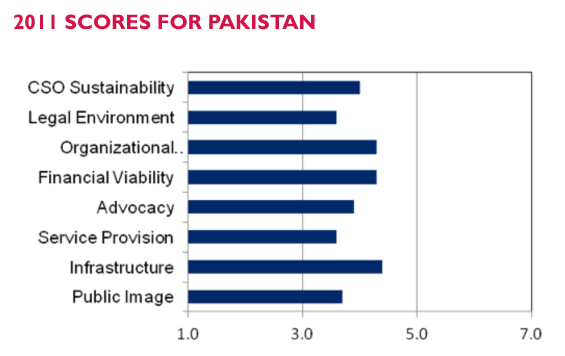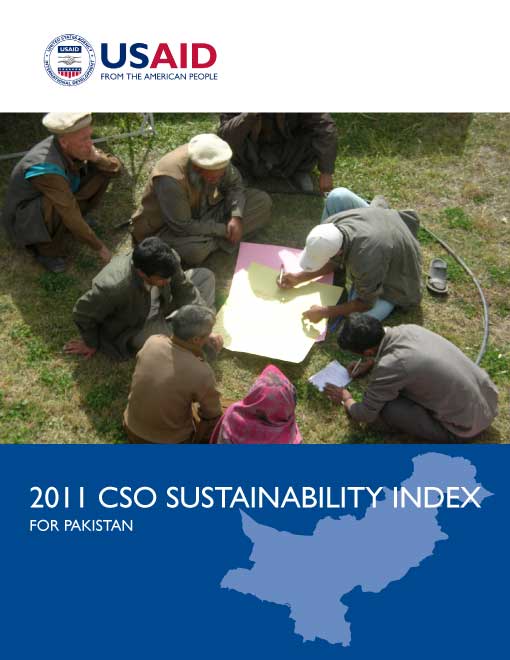- What We Do
- Agriculture and Food Security
- Democracy, Human Rights and Governance
- Democracy, Human Rights and Governance Strategy
- Supporting Free and Fair Elections
- Supporting Vibrant Civil Society & Independent Media
- Protecting Human Rights
- Promoting Accountability & Transparency
- Importance of Democracy, Human Rights, & Governance to Development
- Countering Trafficking in Persons
- Economic Growth and Trade
- Education
- Ending Extreme Poverty
- Environment and Global Climate Change
- Gender Equality and Women's Empowerment
- Global Health
- Water and Sanitation
- Working in Crises and Conflict
- U.S. Global Development Lab
BACKGROUND
The 2011 CSO Sustainability Index for Pakistan reports on the sustainability of the civil society sector in Pakistan based on the assessment of local civil society representatives and experts. The CSO Sustainability Index is an important and unique tool for local civil society organizations (CSOs), governments, donors, academics, and others to understand and measure the sustainability of the CSO sector. This publication complements other editions of the Sustainability Index which cover sixty countries in Central and Eastern Europe and Eurasia, Sub-Saharan Africa, the Middle East and North Africa, and Afghanistan.
APPROACH
The Index analyzes and assigns scores to seven interrelated dimensions of CSO sustainability: Legal Environment, Organizational Capacity, Financial Viability, Advocacy, Service Provision, Infrastructure, and Public Image. These scores are averaged to produce an overall score. Details of the methodology can be found at http://www.usaid.gov/sites/default/files/documents/1866/annexa-cso-susta....
FINDINGS

The overall score for CSO sustainability in Pakistan is 4.0. As the Index reports, the civil society sector in Pakistan encompasses a diverse and broad range of non-state actors, including NGOs, CBOs, coalitions, faith-based organizations, professional associations, trade unions, labor unions, citizen groups, and voluntary organizations. It is estimated to comprise over 30,000 active organizations. Almost half work in education, and 18% focus on civil rights and advocacy, with the remainder involved in social services, health, culture or recreation. In 2011 Pakistan’s CSOs received national and global attention for their constructive role in disaster relief, and CSOs generally provide a wide range of effective and responsive social services. Participatory community development approaches are widespread among CSOs. Civil society also has fairly welldeveloped advocacy capacity; CSOs have successfully lobbied the government to improve legislation in the areas of environment, civic education, child labor, women’s rights, and children’s rights. CSOs are increasingly engaging and cooperating with the government, private sector and media, and CSOs’ capacity to engage in regranting appears to be improving. At the same time, CSOs are heavily concentrated in Punjab and Sindh provinces, and they vary significantly in terms of their size, scope, and effectiveness. Strategic planning, financial diversity, coalition-building and staff retention remain challenges in the sector. Religion plays an important role in shaping Pakistan’s civil society, and religious giving constitutes a significant share of funding for many CSOs. The legal environment and tax regime for civil society in Pakistan is largely favorable, and government is generally supportive.








Comment
Make a general inquiry or suggest an improvement.